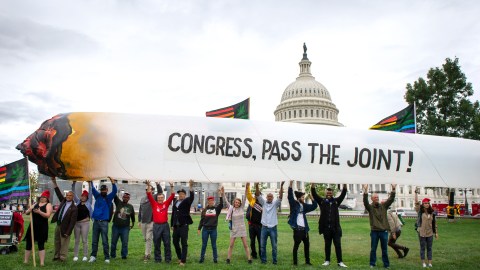Marijuana legalization bill passes historic House committee vote

Caroline Brehman / Getty
- The bill aims to decriminalize marijuana and expunge federal convictions, among other provisions.
- To become law, it still has to pass through the Republican-controlled Senate.
- A majority of Americans support legalizing recreational marijuana, according to a recent Pew survey.
A bill that would decriminalize and deschedule marijuana at the federal level passed 24 to 10 in the House Judiciary Committee, marking the first time a Congressional body has approved legalization-related legislation.
The bill — called the Marijuana Opportunity Reinvestment and Expungement (MORE) Act of 2019 — aims to:
- Remove marijuana as a federally controlled substance
- Expunge federal convictions and arrests for marijuana
- Create a Cannabis Justice Office that would levy a 5% tax on marijuana sales in states that have already legalized the drug
- Allocate federal resources to communities that have been negatively impacted by the war on drugs
- Allow the Small Business Administration to issue loans and grants to marijuana-related businesses
Under MORE, states would still be able to decide whether or not to legalize marijuana, or expunge convictions. To become federal law, the MORE Act would have to pass through other House committees, and it would then face the more difficult task of passing through the Republican-controlled Senate, where conservative leadership could choose not to consider the bill. Of the 24 House Judiciary Committee members who approved MORE, two were Republican: Matt Gaetz of Florida and Tom McClintock of California.
The More Act was introduced by Rep. Jerrold Nadler, D-N.Y., and co-sponsored by more than 50 lawmakers.
“These steps are long overdue,” Nadler said in a statement. “For far too long, we have treated marijuana as a criminal justice problem instead of a matter of personal choice and public health. Whatever one’s views on the use of marijuana for recreational or medicinal purposes, arresting, prosecuting, and incarcerating users at the federal level is unwise and unjust.”
Most Americans seem to agree. In a November 2019 survey from the Pew Research Center, more than half of U.S. adults said medical and recreational marijuana should be legal, with only 8 percent of adults saying it should be illegal in all forms.
Currently, 11 states and the District of Columbia have legalized both recreational and medicinal marijuana, while medicinal marijuana is available in 33 states and the District of Columbia, Guam, Puerto Rico and the U.S. Virgin Islands, according to the National Conference of State Legislatures.
A (mostly) partisan issue
Despite public support, it seems many Republicans are at least skeptical, if not outright opposed, to pursuing marijuana legislation.
“I don’t think a majority of the Republicans will support this bill,” Colorado Republican and Committee member Ken Buck, said Wednesday. “It is even less likely that the Senate would take it up. Therefore, I would just suggest that we deal with other bills that we can get a much larger bipartisan support from.”
Meanwhile, almost all of the Democratic 2020 presidential candidates support marijuana legalization, except former Vice President Joe Biden. During the primary debate on Wednesday, Biden opposed legalizing marijuana at the federal level, suggesting more scientific research is needed to see whether it’s a “gateway drug.” The Centers for Disease Control and Prevention agrees that more research is needed, but notes that the “majority of people who use marijuana do not go on to use other, “harder” substances.”
The costs of prohibition
Even if there are social costs to legalization, prohibition isn’t free. The American Civil Liberties Union estimates there were 8.2 million marijuana-related arrests in the U.S. between 2001 and 2010, with police spending about $4,390 per arrest and $73,170 per felony conviction. For cases that didn’t lead to conviction, individuals might have spent thousands of dollars on legal services or fines related to the charge.
The MOVE Act might not become law, but many legalization advocates see it as a promising sign in the broader fight against the war on drugs.
“Today’s vote marks a turning point for federal cannabis policy, and is truly a sign that prohibition’s days are numbered,” Aaron Smith, executive director of the National Cannabis Industry Association (NCIA), told Forbes.





